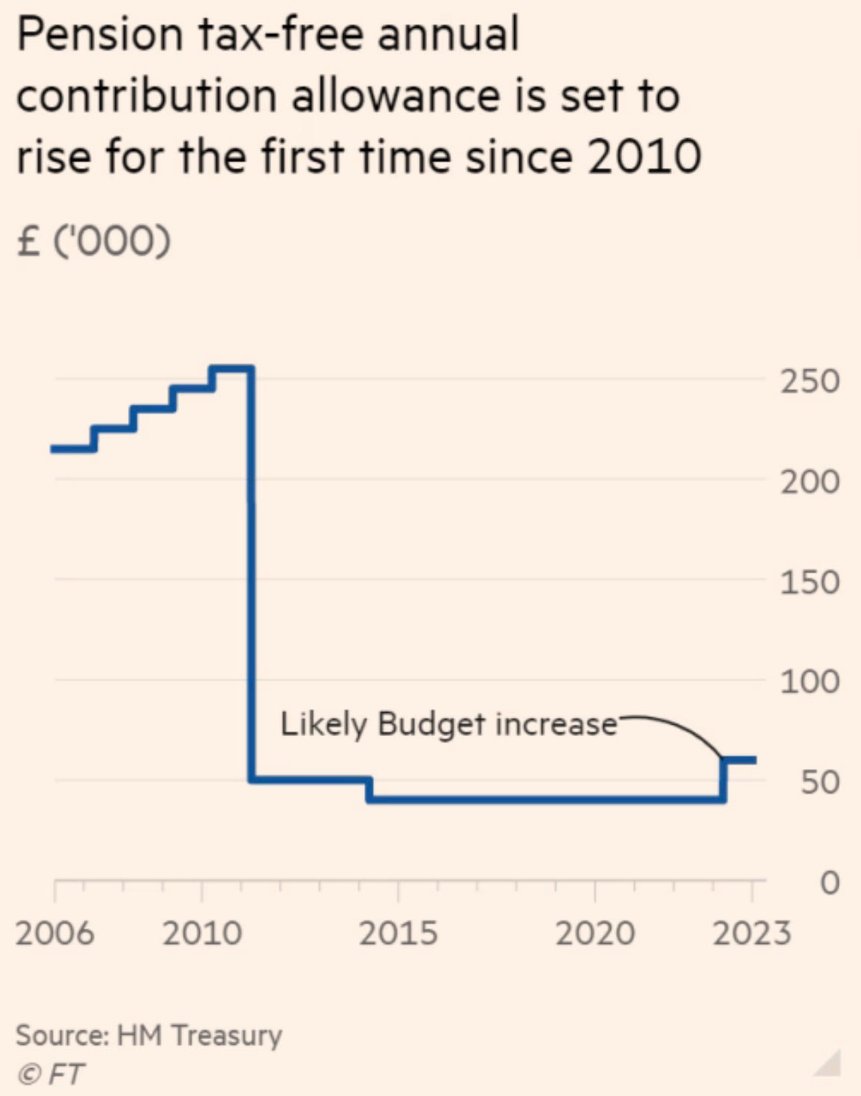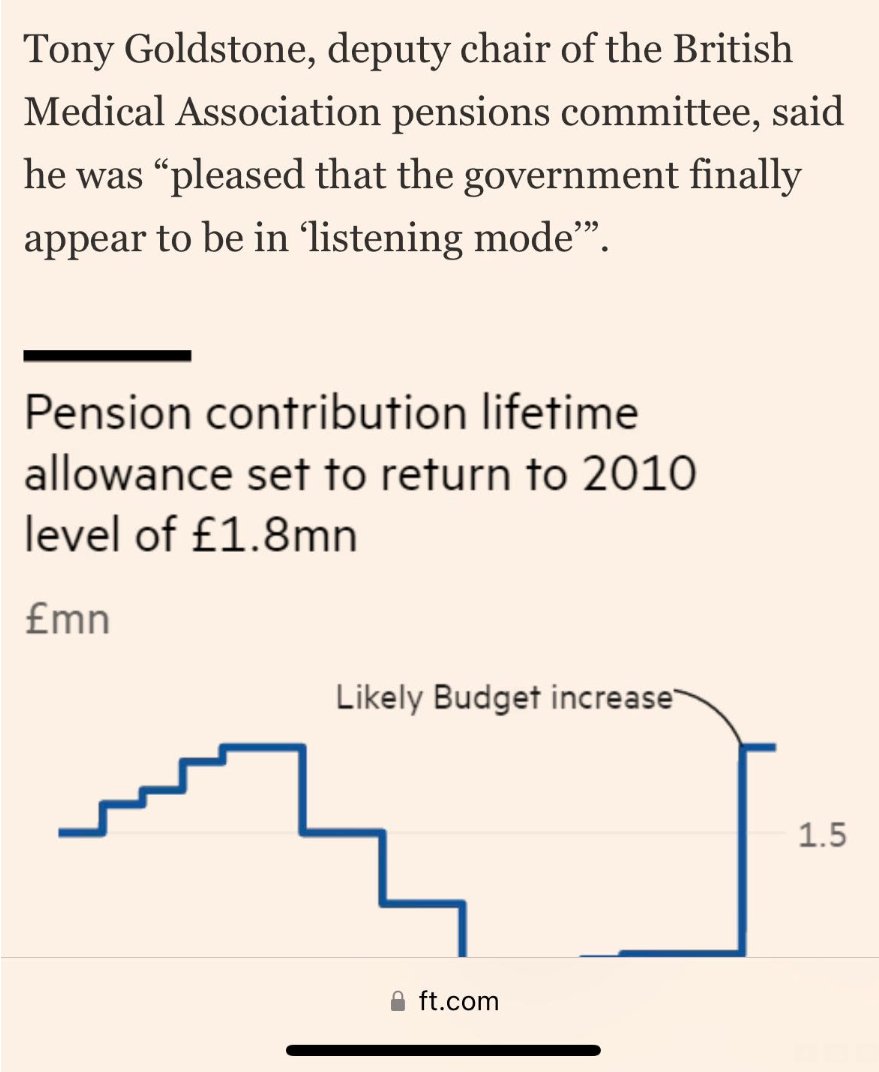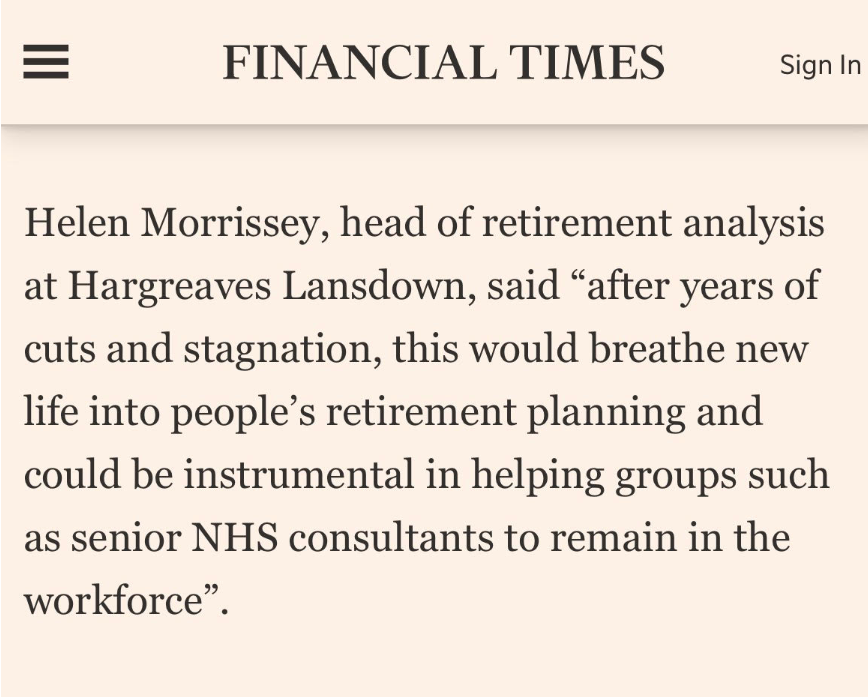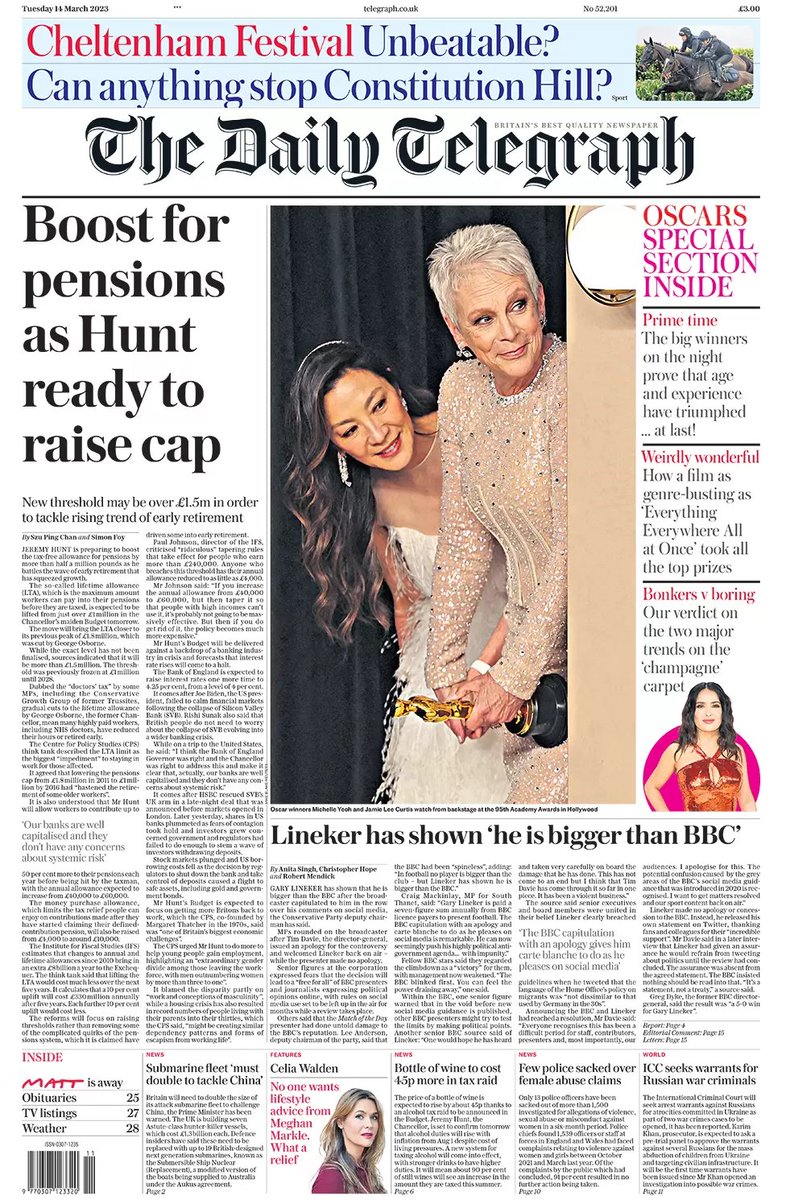1/29 We need to talk about these graphs 👇
We have nurses & junior doctors on strike & consultants potentially joining them very soon. Lets talk about inflation & pay. How to fix this car crash (& perhaps more importantly, how NOT to). Please read full 🧵 to end and share / RT

We have nurses & junior doctors on strike & consultants potentially joining them very soon. Lets talk about inflation & pay. How to fix this car crash (& perhaps more importantly, how NOT to). Please read full 🧵 to end and share / RT

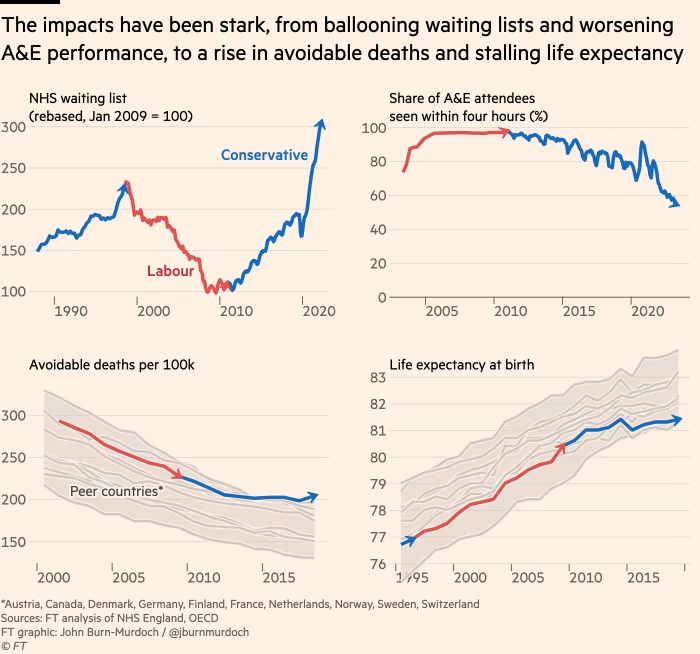
2/29 Lets start with the excellent pay graphs from the excellent @jburnmurdoch from the @FT published this week.
What do they show? They show we are NOT "all in this together"

What do they show? They show we are NOT "all in this together"


@jburnmurdoch @FT 3/29 Let me explain. The top blue line - representing "all workers" from "all sectors" are broadly close in pay terms where their pay was in March 2009 - before austerity began to bite (around only 3.1% below in real terms) 



@jburnmurdoch @FT 4/29 But nurses when measured against "CPI" measure of inflation are up to Dec 22 (the latest @NHSDigital data) are DOWN 12.2% and junior doctors a shocking 23.6% DOWN against this measure 

@jburnmurdoch @FT @NHSDigital 5/29 Now you may have seen other figures, because of different ways of measuring the loss. First it depends WHEN the comparison STARTS- @FT graphs starts in Mar 09 (12 m to March 09) when public sector pay austerity broadly started, @NuffieldTrust👇 misses v steep initial loss 

@jburnmurdoch @FT @NHSDigital @NuffieldTrust 6/29 Secondly there are different measures of inflation. The most commonly used is CPI or "consumer price index", others include "retail price index". The former is preferred by government & economists.
@jburnmurdoch @FT @NHSDigital @NuffieldTrust 7/29 The latter RPI runs higher generally, but is a valid measure & is even used by government i.e. in student loans.If you think these are bad 👇 those losses against RPI are much greater - nurses would be DOWN 23.7%, and junior doctors DOWN 33.6% (to Dec 22). 

@jburnmurdoch @FT @NHSDigital @NuffieldTrust 8/29 Finally there are different pay measures. The @FT have used official @NHSDigital "average earnings" data including for example overtime, out of hours payments etc. Others comparison may use basic pay, or "take home" pay which would include for example pension contributions 
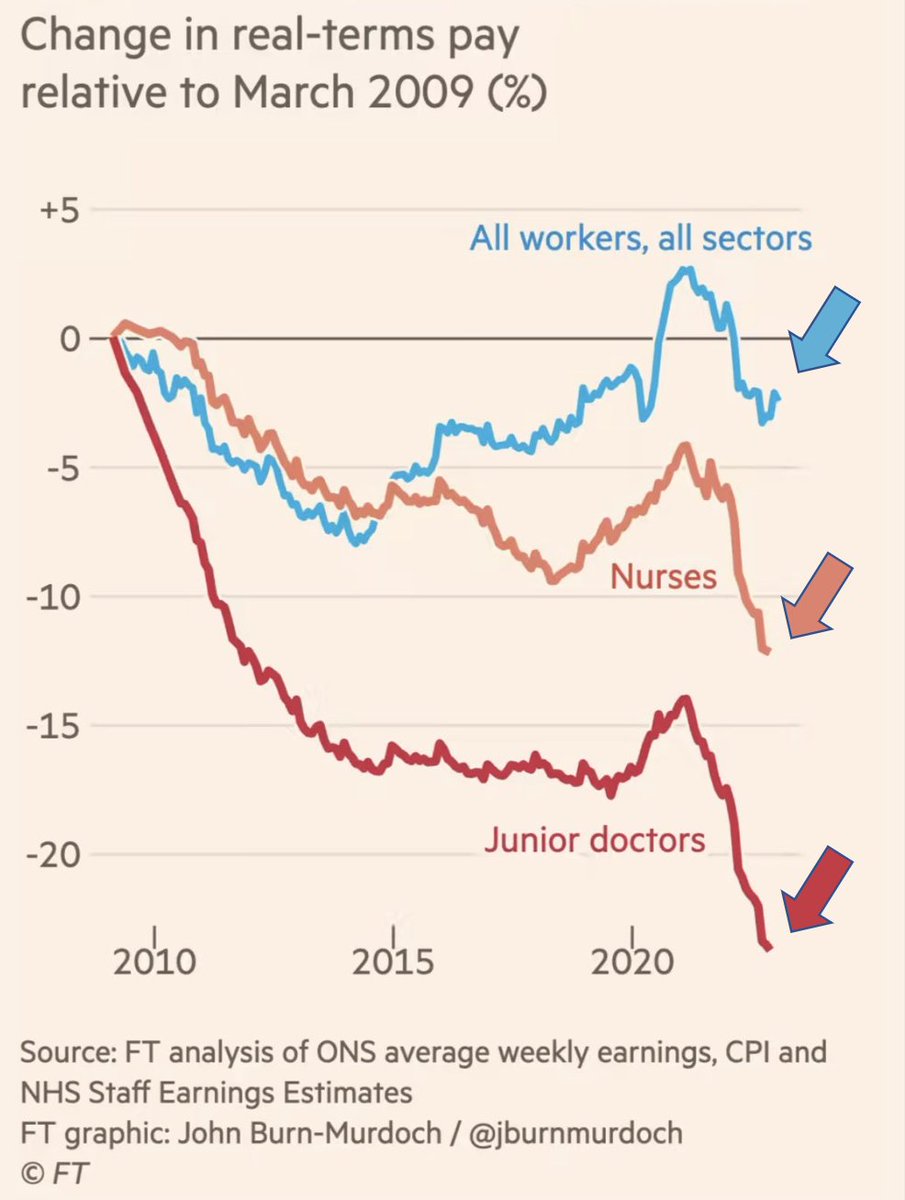
@jburnmurdoch @FT @NHSDigital @NuffieldTrust 9/29 So many ways to skin a cat. If done correctly they are all valid. So since @jburnmurdoch excellent & shocking chart (LT) gots lets of traction, I set out to see if it was accurate. To do that, I set out to see if it was reproducible from publically available data (RT) 



@jburnmurdoch @FT @NHSDigital @NuffieldTrust 10/29 And unsurprisingly given the total legend that is @jburnmurdoch @FT, his chart is accurate and reproducible. Junior pay is tricky due to contract change, but I broadly agree with his methodology to overcome this hence my chart (RT) is virtually identical to his (LT) 



@jburnmurdoch @FT @NHSDigital @NuffieldTrust 11/29 The initial FT chart look at two groups who have already ballotted for IA - nurses & junior doctors. Other groups have seen similar terrible erosion of pay and are about to ballot if government don't get their act together including consultants which I have added below👇 
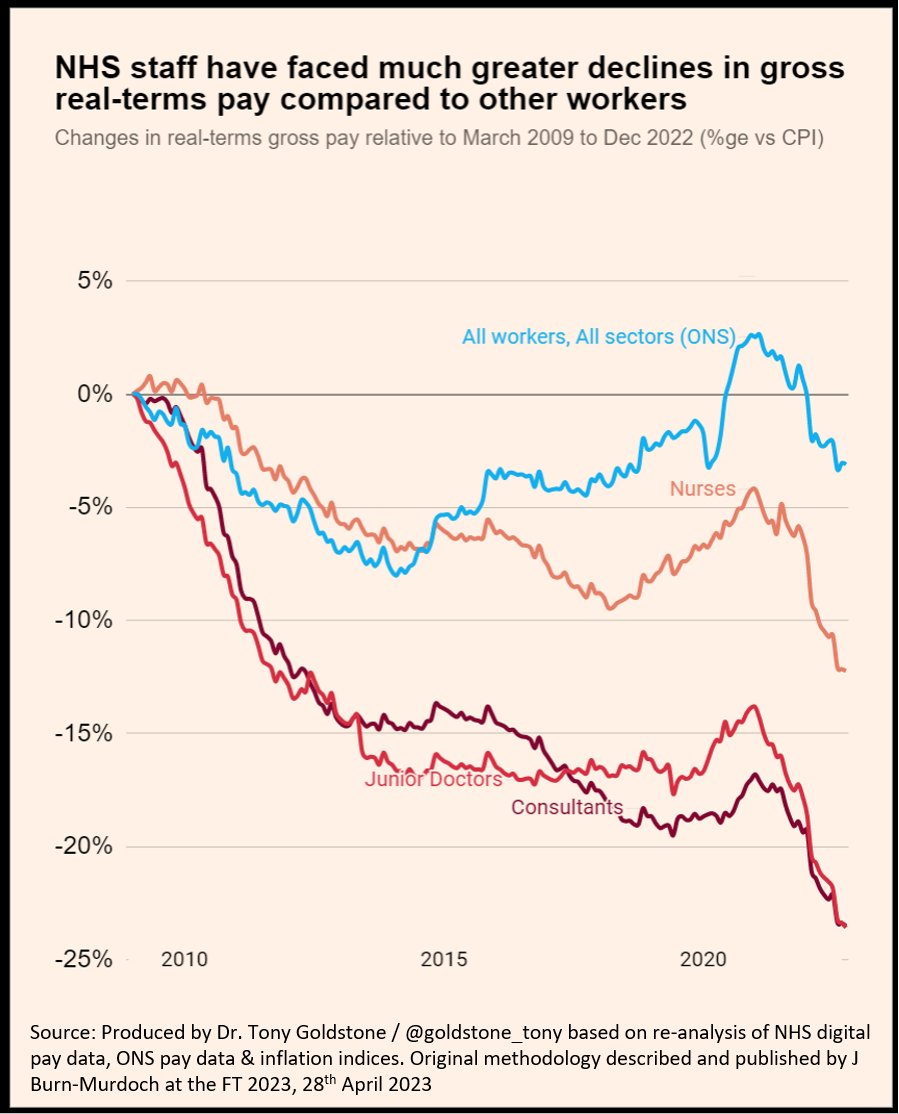
@jburnmurdoch @FT @NHSDigital @NuffieldTrust 12/29 As noted above, there are different ways of looking at pay erosion for example using this "@FT methodology" (LT; gross earnings; CPI) vs for example that seen in the BMA pay campaign (RT; take home; RPI) - both are correct but expressing the loss in a different way 



@jburnmurdoch @FT @NHSDigital @NuffieldTrust 13/29 So like junior doctors, consultants have seen AWFUL erosion of pay which is broadly equivalent to juniors when measured this way.
I can see why @jburnmurdoch has used "all workers, all sectors" as the comparator, but there are others which might be more representative
I can see why @jburnmurdoch has used "all workers, all sectors" as the comparator, but there are others which might be more representative

@jburnmurdoch @FT @NHSDigital @NuffieldTrust 14/29 So for example @ONS have other pay comparators like "professional, scientific & technical" which might be a more apt comparator for highly skilled doctors & nurses - this comparator does better than inflation in the same time period (grey line) 

@jburnmurdoch @FT @NHSDigital @NuffieldTrust @ONS 15/29 Or perhaps noting the @bankofengland comments this week we all "need to accept they are poorer", maybe lets compare to how others are doing in another @ONS dataset "finance & business services" (grey line)
Maybe everyone isnt feeling poor in equal measure @bankofengland

Maybe everyone isnt feeling poor in equal measure @bankofengland


@jburnmurdoch @FT @NHSDigital @NuffieldTrust @ONS @bankofengland 16/29 So in summary so far, there is HUGE inequality on whose pay has been eroded. Nurses and in particular doctors of all grades, have seen the largest cuts making the UK very uncompetitive & "leaky" and unable to *RETAIN* doctors & nurses
@jburnmurdoch @FT @NHSDigital @NuffieldTrust @ONS @bankofengland 17/29 Lets now move onto solutions. To do that we need to UNDERSTAND inflation. There are two charts below on inflation, both showing the same thing - inflation.
The top graph show HEADLINE INFLATION. This is how prices change vs 1 year ago.
Bottom graph shows PRICES
The top graph show HEADLINE INFLATION. This is how prices change vs 1 year ago.
Bottom graph shows PRICES

@jburnmurdoch @FT @NHSDigital @NuffieldTrust @ONS @bankofengland 18/29 So when Inflation🔼📈(red shaded)- prices UP FAST
Inflation🔽📉(green)- prices still go UP but more UP SLOWLY
The crucial point is that *PRICES ARE ALWAYS GOING UP* (unless inflation is negative, which is rare)
Inflation🔽📉(green)- prices still go UP but more UP SLOWLY
The crucial point is that *PRICES ARE ALWAYS GOING UP* (unless inflation is negative, which is rare)

@jburnmurdoch @FT @NHSDigital @NuffieldTrust @ONS @bankofengland 19/29 The *ONLY* way pay can compensate for this is with a *CONSOLIDATED* pay rise, a one off "bonus" does nothing to help you pay NEXT years higher prices, or later years, or indeed higher prices in your reitrement (another reason why rises must be consolidated i.e. pensioned) 

@jburnmurdoch @FT @NHSDigital @NuffieldTrust @ONS @bankofengland 20/29 So you will have heard that inflation is coming down. And thats right it is coming down. So the @OBR_UK predict inflation will come down rapidly, largely due to falling energy prices which are now similar in price to the start of the Ukraine invasion. 



@jburnmurdoch @FT @NHSDigital @NuffieldTrust @ONS @bankofengland @OBR_UK 21/29 Its great that inflation is coming down, but you're still poorer as prices will not come down, just rise more slowly.
To fix that your pay needs to rise. And many leading economists have debunked the myth that public sector rises are inflationary
To fix that your pay needs to rise. And many leading economists have debunked the myth that public sector rises are inflationary
https://twitter.com/TheBMA/status/1648732298873798668?s=20
@jburnmurdoch @FT @NHSDigital @NuffieldTrust @ONS @bankofengland @OBR_UK 22/29 So given at the time of writing this thread our nursing colleagues @theRCN are on strike, and have rejected a pay offer from government, lets have a quick look at that offer. To look at that offer, lets consider the impact of falling inflation as predicted by @OBR_UK
@jburnmurdoch @FT @NHSDigital @NuffieldTrust @ONS @bankofengland @OBR_UK @theRCN 23/29 So @OBR_UK also predict what will happen to pay across the whole economy (thats the dotted blue line), now extended to end of 25/26. So the "whole economy" will be back up above that "zero" baseline (and no doubt our other comparators will do even better than that) 

@jburnmurdoch @FT @NHSDigital @NuffieldTrust @ONS @bankofengland @OBR_UK @theRCN 24/29 So where does that leave NHS staff? In a difficult place I would say. The 6% non-consolidated "bribe" (down orange arrow) helps staff for that year (22/23) but then leaves them right back where they started, which is massively down. Doesnt seem "fair" or "generous" me 

@jburnmurdoch @FT @NHSDigital @NuffieldTrust @ONS @bankofengland @OBR_UK @theRCN 25/29 I can see why @theRCN @unitetheunion @SCoRMembers have rejected this pay deal- quite frankly IMHO its an insult to their intelligence as as per the orange line below (broadly the same most AFC workers), it doesn't fix their underlying pay issue (assuming 2% 24/25; 1% 25/26) 

@jburnmurdoch @FT @NHSDigital @NuffieldTrust @ONS @bankofengland @OBR_UK @theRCN @unitetheunion @SCoRMembers 26/29 In the context of historic pay awards and predicted inflation, those predicitons are not at all unrealistic where pay has been severely restrained by the "not so independant after all" pay review bodies
@jburnmurdoch @FT @NHSDigital @NuffieldTrust @ONS @bankofengland @OBR_UK @theRCN @unitetheunion @SCoRMembers 27/29 Similarly if government think these sorts of pay awards (i.e. 5%/2%/1% for 23/24-25/26) - or ANYTHING close to this, these pay disputes will NOT be going away any time soon 

@jburnmurdoch @FT @NHSDigital @NuffieldTrust @ONS @bankofengland @OBR_UK @theRCN @unitetheunion @SCoRMembers 28/29 To fix this properly, pay needs to be restored so those lines can get back to zero. Thats what "pay restoration" means. You can ONLY get their with above inflation, consolidated pay rises. The solution is as simple as that. That's what #payrestoration is 

@jburnmurdoch @FT @NHSDigital @NuffieldTrust @ONS @bankofengland @OBR_UK @theRCN @unitetheunion @SCoRMembers 29/29 Our NHS is on its knees (left). Our 7m+ waiting lists and rising avoidable deaths are not due to striking NHS workers, or (just) covid, but due to political choices.
RT if you want government to make the choice to fix this mess now & properly #payrestoration #fixDDRB

RT if you want government to make the choice to fix this mess now & properly #payrestoration #fixDDRB

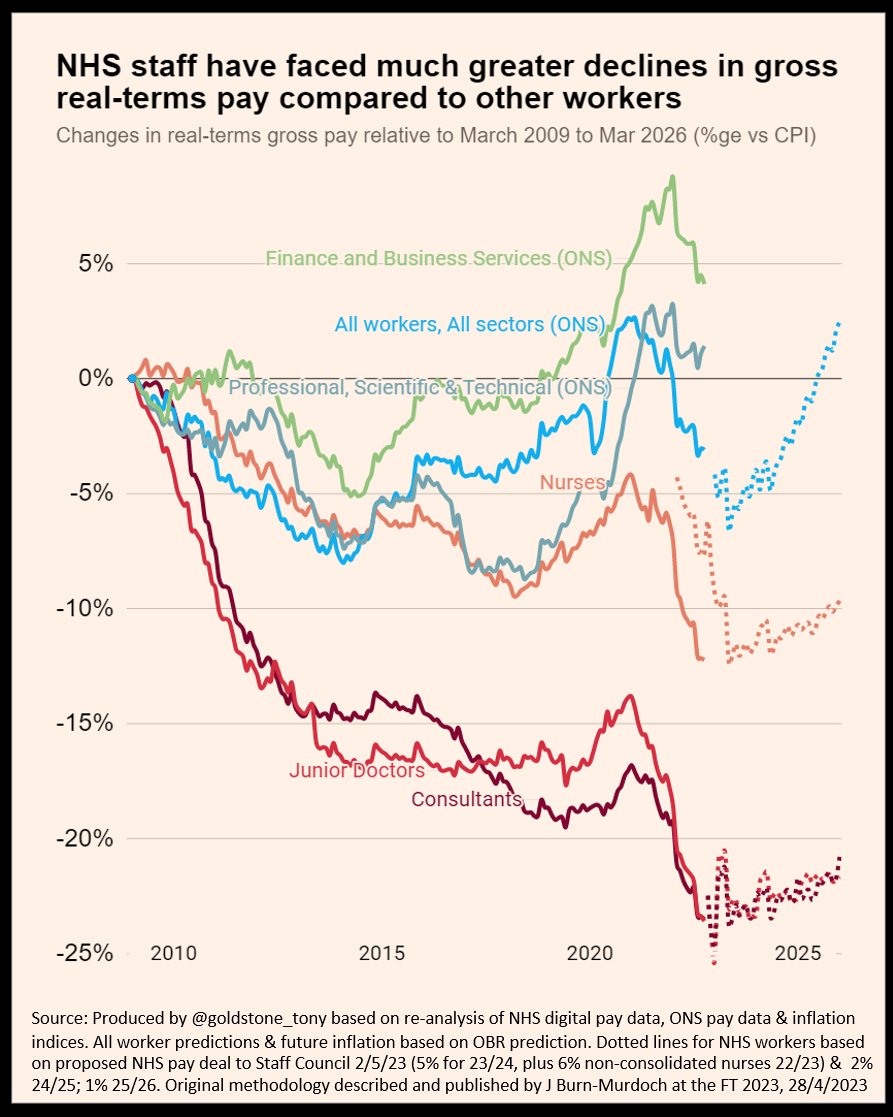
• • •
Missing some Tweet in this thread? You can try to
force a refresh

 Read on Twitter
Read on Twitter



